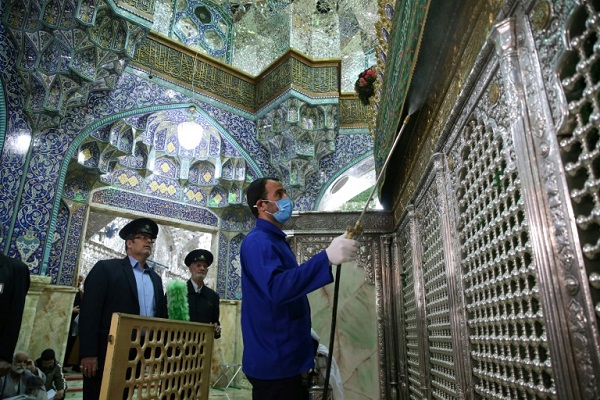Iran’s Deputy Health Minister Iraj Harirchi confirmed rumors this Tuesday that he contracted the coronavirus and was therefore in quarantine. The official appeared on Monday at a press conference looking desperately unwell - sparking fears that senior officials had been compromised. In an interview with the state-run news outlet IRNA, a spokesman for the ministry said that Harirchi had been experiencing weakness and flu-like symptoms on Monday ahead of a news briefing, and tested positive for the virus later in the day. While it is unclear how he contracted the virus, sources close to the government have warned that Iran’s religious centers and universities are likely to sit at the centre of the epidemic. With millions of pilgrims and foreign students flying in and out of Iran every year, the spread of the virus could very quickly overwhelm the country’s health system and lead to some serious national security issues. The holy city of Qom - an hour drive or so from Tehran, the capital, attracts on its own some 22 million pilgrims per year, in addition to an estimated 2.5 million foreign students, mainly from the Middle East and Asia - where the virus has proven to be most virulent. Since Monday another senior state official, Mahmoud Sadeghi - a prominent member of Parliament confirmed on Twitter that he too had fallen ill with the coronavirus. Officially Iran’s coronavirus ‘situation’ has not yet reached critical mass - with 15 deaths since the outbreak and a reported 95 identified cases, the word epidemic is a long way away … and yet reliable sources within the health ministry have warned that official figures are not a true reflection of reality. Speaking to Elaph an epidemiologist based in Tehran explained that while Iran is making every effort to contain the spread of the virus, crippling sanctions and fears of popular hysteria have limited the state’s response ability - putting the Islamic Republic at risk of both a mass epidemic and social unrest. “I can personally confirm that several prisons and universities across the country have been infected and this could lead to a very serious health crisis. Iran simply cannot handle an epidemic, our health system is barely functioning as it is … There is no way of telling what impact the coronavirus will have on the country, let alone the region unless the international community steps in.” Health Minister Saeed Namaki said the virus reached the country through an Iranian merchant from Qom who used to travel to China regularly. "Flights were suspended between the two countries, but he used indirect flights," Namaki said on Sunday, urging people not to travel to the holy city. More troubling for Iran still is the impact an epidemic will have on its institutions and evidently its economy at such a delicate juncture in time - the Islamic Republic is facing mounting pressure both at home and abroad as criticism for both its system of governance and its foreign policy has widened. While the cleric made several appearances in public to comment on last Friday’s parliamentary elections, news of a state cover-up have persisted. Atoosa Lankarani, a political blogger from Tehran warned that most Iranians have lost all faith in state officials, preferring to turn to social media and Google to keep abreast with news on the coronavirus and how to avoid contamination. “In the past few days hospitals in the capital have been inundated with people demanding to be screened. There is a very palpable mistrust and anger towards our government. People are suffering … it has been one thing after the other and people cannot cope anymore.” Speaking to Elaph, Ali Daghestani, a junior official based in Qom commented, “Senior government officials and high ranking members of the clergy have been exposed … the seat of government is in a complete lockdown situation. Iran’s security apparatus is taking over and that plays into rumors that Ayatollah Khamenei may have contracted the virus. Needless to say that Iran is facing much uncertainty.” He added, “Historically Tehran has used the Basij forces to crackdown on political dissent. Now once again those forces have been deployed and it signals the seriousness of the crisis.” If Iran’s tone remains defiant in the face of the developing health crisis - Ayatollah Khamenei accused last Friday western capitals of rigging the elections by heightening the public’s fear of a deadly epidemic, Tehran is bracing itself for impact. “An epidemic could throw Iran completely out of balance, and this time I fear the public will not show much patience … there is genuine fear among state officials that the coronavirus will unravel what decades of economic sanctions and political pressure could not,” stressed Mr Daghestani from Qom. And, “Iran is now the second focal point of the coronavirus outbreak - after China, and Iran’s struggles to contain the epidemic will have far reaching repercussions … not just for the region but the world at large if we keep in mind that any outstanding pockets of contamination could spark a second wave.” Indeed, the Middle East is in many ways the perfect place to spawn a pandemic, experts have warned, with the constant circulation of both Muslim pilgrims and itinerant workers who might carry the virus. |






التعليقات